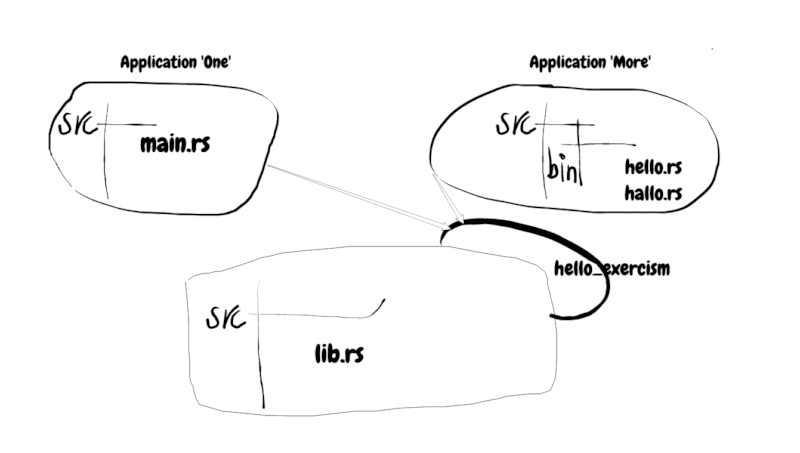44 releases (4 breaking)
| 0.5.5 | Oct 7, 2019 |
|---|---|
| 0.5.4 | Oct 7, 2019 |
| 0.4.10 | Oct 4, 2019 |
| 0.4.1 | Sep 29, 2019 |
| 0.1.9 | Sep 21, 2019 |
#950 in Testing
316 downloads per month
89KB
53 lines
The Rust Language Tool: Cargo

About this Crate hello_exercism
- How to Create a Workspace
- How to Create and Publish an Own Crate
- How to Use an Own Crate
- How te develop the unit tests with the folder 'tests'
- How te develop the unit tests for private codes
- How te develop the integration tests with the folder 'tests'
- How te develop the integration tests with the folder 'src'
Table of Contents
- I. create a workspace
- II. develop the crate
- III. use the crate
- IV. create the crate doc in local version
- V. create the crate doc in server version
I. create a workspace
# create a workspaces
mkdir workpsaces && cd workpsaces
# create a workspace 'hello-world'
mkdir hello-world && cd hello-world
# create a configration for the workspace
touch Cargo.toml
# four crates for this workspace
# the follow lines is ONE command
echo '[workspace]
members = ["lib-hello", "bin-hello", "bin-local-hello", "lib-extern"]' >> Cargo.toml
II. develop the crate
1. create the default crate
mkdir lib-hello && cd lib-hello
# this is Crate Root Path
cargo init --name hello_exercism --lib
2. develop the crate source and test codes for folder 'tests'
- Go to Crate Root Path
vi Cargo.toml
vi src/lib.rs
mkdir tests
touch tests/u_hello.rs
vi tests/u_hello.rs
touch tests/i_hello.rs
vi tests/i_hello.rs
cargo test
3. develop the example codes
- Go to Crate Root Path
mkdir examples
touch examples/u_hello.rs
vi examples/u_hello.rs
cargo run --example u_hello
touch examples/i_hello.rs
vi examples/i_hello.rs
cargo run --example i_hello
4. develop the crate source and test codes for folder 'src'
vi src/lib.rs
mkdir -p src/integration_tests
touch src/integration_tests/mod.rs
vi src/integration_tests/mod.rs
touch src/integration_tests/i_hello.rs
vi src/integration_tests/i_hello.rs
mkdir -p src/private_tests
touch src/private_tests/mod.rs
vi src/private_tests/mod.rs
touch src/private_tests/owned_hello.rs
vi src/private_tests/owned_hello.rs
cargo test
5. publish the own crate to crates.io
- register the crates.io with github.com account
- login the crates.io
- get the token
- run the follow command in computer
## run the follow commant at A time
cargo login <token>
## can repeat the follow commands
cargo test
## commit and push the codes in github.com
cargo package
cargo publish
## change the release github.com
III. use the crate
1. create the default Bin
mkdir bin-hello && cd bin-hello
# this is Bin Root Path
cargo init --name bin-hello --bin
2. configure the file Cargo.toml
- Go to Bin Root Path
echo 'hello_exercism = "0.4.0"' >> Cargo.toml
3. edit the rust file main.rs
- Go to Bin Root Path
// vi src/main.rs
use hello_exercism;
fn main () {
println!("{}",hello_exercism::hello());
assert_eq!("Hello, World!", hello_exercism::hello());
}
4. run the Bin program
- Go to Bin Root Path
cargo run main
IV. create the crate doc in local version
- Go to Crate Root Path
cargo doc --open --package hello_exercism
V. create the crate doc in server version
- github.com >> >> Setting >> Options >> GitHub Pages >> (INFO...)
- Go to Crate Root Path
mkdir <REPOSITORY>/docs/<PROJECT_NAME>
cargo doc
cp -rf target/doc/. <REPOSITORY>/docs/<PROJECT_NAME>/.
- Example:
- Go to Crate Root Path
mkdir -p ../../docs/hello-world
cargo doc
cp -rf target/doc/. ../../docs/hello-world/